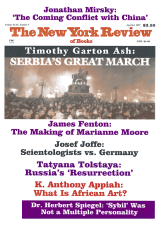Edmund Wilson insisted that a gift for impersonation is the fiction writer’s sine qua non as it is the actor’s. V.S. Pritchett went a step further:”Throwing something of oneself away is a way of becoming, for the moment, other people, and I have always thought that unselfing oneself, speaking for others, justifying those who cannot speak, giving importance to the fact that they live, is especially the privilege of the storyteller and even the critic—who is also an artist.” Like Wilson, V.S.P. was suspicious of general ideas: “I have always been wary,” he wrote, “of what used to be called ‘committal’ to the social and political ideologies which numbers of my contemporaries preached…. The People dissolved as I saw real people living in conditions unlike my own but with passions like mine and as proud of something unique in them.”
He was blessed, in other words, with the power of self-effacement which Shakespeare possessed so enormously that he left hardly a trace of himself as a person. “I…carry what Keats called the indispensable sense of ‘negative capability’ about with me,” which is to say he encountered the objective world with awe. His genius was to convey this respectfulness to his readers in his literary essays (of which he contributed more than a hundred to these pages), his memoirs, his travel writing, and his fiction, with the precision and innocent enthusiasm that one finds in the great naturalists, which is not to say that he was uncritical of his findings. “I am a humanist,” he wrote on the occasion of his eightieth birthday, “but I do not think human beings are rational: their greeds and passions are not quickly outgrown. We have now to school ourselves to deal with danger and tragedy.”
As for himself as a friend, the word that comes to mind is adorable. His sense of the world’s triumphs and failings expressed itself in such gentleness of character, such gratitude for life’s favors—especially for the love bestowed on him by his wife, Dorothy—that he seemed at times, for all his humanity, to belong to a different species from the rest of us. He had no religious faith, he wrote in his birthday memoir. “I am no pantheist or sentimentalist in my love of Nature but simply an idolater of leaf, hill, stream and stone.” His absence is terrible to contemplate but his presence in his work and in our memories is a constant joy.
This Issue
April 24, 1997



